Candid Cameron
The shadow of Munter’s predecessor, Anne Patterson, still falls heavily over Pakistan thanks to Wikileaks.
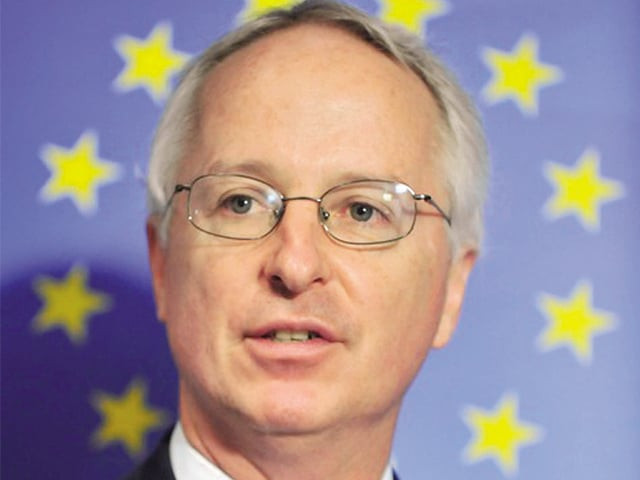
Candid Cameron
The shadow of Munter’s predecessor, Anne Patterson, still falls heavily over Pakistan thanks to Wikileaks. The cables she wrote about the Pakistani leadership have been quoted extensively in the media recently. In these excerpts, sometimes Patterson was a confidante, and was seen as would-be ally, as her cables about JUI chief Fazlur Rehman indicate. At other times, she was privy to President Zardari’s concerns about the Sharif brothers. And in public, she was often portrayed as the wicked witch of the West — a strict taskmaster who kept the Pakistani leadership in line.
The cables highlight the unique and complicated burden of her office — in a cable created in February 2009, Patterson says: “As Vice President Biden has noted, however, the relationship for too long has been transactional in nature. It also has been based on mutual mistrust. Pakistan hedges its bets on cooperation because it fears the US will again desert Islamabad after we get Osama Bin Laden; Washington sees this hesitancy as duplicity that requires we take unilateral action to protect US interests… The relationship is one of co-dependency we grudgingly admit — Pakistan knows the US cannot afford to walk away; the US knows Pakistan cannot survive without our support.”
And now Cameron Munter has walked into the fray. He is seen by many as having a softer touch than Patterson. Recently, in a departure from the more hands-off approach adopted by his predecessors, he rolled up his sleeves and did some heavy lifting in a flood relief camp in Sindh. His previous postings include Iraq and Belgrade, but his background — he received a doctorate degree in modern European history in 1983 and taught for about four years in California and New York- is more academic than Patterson’s.
In person, the Ambassador is exceptionally soft spoken. His measured tones invite confidence, but a few minutes in his
presence reveal that he isn’t about to let his own guard down any time soon.
Munter is quick to dismiss the idea that his time in volatile hotspots Iraq and Belgrade prepped him for his posting in
Pakistan. “It’s hard to compare my posting in Iraq, for example, to my role here in Pakistan,” he says. “In Iraq we were fighting a war. In Pakistan, you don’t have a war.”
The ambassador also dismissed the possibility that the disclosures made in leaked diplomatic cables had affected his interaction with the Pakistani leadership. “I’ve had discussions with your leadership about this, and we both remain committed to our relationship,” he says. Munter asserted that he had not noticed a difference in the way Pakistani officials communicated with him, and stressed that he tried to create an atmosphere of openness in all his discussions: “In fact, one of the qualities of a good diplomat is that he can be straightforward and open, which I do try to be,” he says.
Other reports from across the globe, however, tell a different story. On the day this interview was conducted, news reports quoted a Pentagon spokesman, Colonel Dave Lapan, saying that some countries were displaying hesitation in their dealings with US diplomats. “Generally, there has been a retrenchment [in co-operation],” Lapan was quoted saying. P J Crowley, the state department spokesperson, also admitted that the US faced a backlash, saying that on one occasion, a US diplomat was asked to leave a notebook outside a meeting room due to privacy concerns.
This is not the only setback Munter has to face - he acknowledges that managing Pakistan-US relations is fraught with difficulty, and admits that Pakistani skepticism of US policy is justified to some extent. “It’s justified to some extent because we haven’t done a very good job of explaining ourselves,” he says. “But we are committed to overcoming this, and we are constantly trying to explain ourselves better, not just to the Pakistani government but to the Pakistani people.”
The ambassador said that the US had a desire to know what people “beyond Islamabad” thought and felt about their ally, adding that, in his opinion, US security concerns have not and will not trump civilian engagement. “We have a longer commitment to Pakistan, to its people, to the democratic process,” he says.
Whether this commitment can be honoured, however, is a different story. Observers fear that any Pakistan-friendly policies that President Obama endorses will not pass through Congress easily, in the wake of the 2010 US midterm elections, which saw the Republican Party win a majority in the House of Representatives.
During his tour of Karachi, Munter repeatedly stressed his commitment to improving opportunities for Pakistani exports to America, and praised his European counterparts for their success in supporting similar policies. However, when pushed, Munter conceded that certain trade policies regarding Pakistan that had been presented before Congress had been opposed.
“The plans [for these policies] have been drawn up, and have been presented in Congress, but we have had difficulties getting this approved,” says Munter. “I couldn’t tell you what quarters this opposition came from — to be honest I don’t know myself. There are people in the US who have their reservations; there are concerns about the security situation in Pakistan and things like that.”
Munter was quick to point out that the US was also interested in seeing investment in Pakistan improve. “I would say our focus should be aid, trade and investment. Our goal is to see Pakistan stand on its own two feet. I would like to see investment pouring into Pakistan from everywhere, from us, from Europe, even from India, I don’t care!”
Despite the levity, then, the ambassador seems very aware of the difficulties of implementing US policy in Pakistan, both on the home front and in Islamabad. After the rough months that marked the end of 2010 — does the ambassador see any positive developments at all in Pakistan?
“There are so many things,” he says. “The openness of the society- the growth of business and industry, the openness of the media — Pakistan has one of the most free media industries that I’ve ever seen. And the demographic; you have a really young population that could really work in the country’s favour,” he says.
Perhaps, then, the way forward for the US diplomat in Pakistan is to tread softly — and leave the notebook at home.
Published in The Express Tribune, December 19th, 2010.

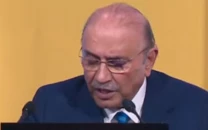
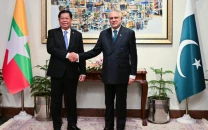


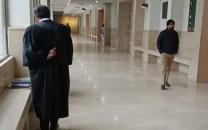
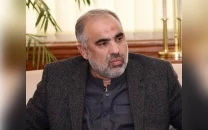












COMMENTS
Comments are moderated and generally will be posted if they are on-topic and not abusive.
For more information, please see our Comments FAQ